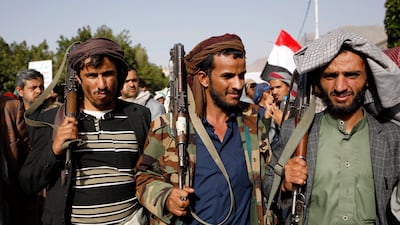Houthi rebels have rejected a unilateral ceasefire planned by the Saudi-led coalition fighting in Yemen.
The coalition announced on Tuesday it would begin the ceasefire at 6am on Wednesday to enable political talks to take place in the kingdom. The Iran-backed Houthis are boycotting the discussions.
The Houthis said the proposal was meaningless without the coalition fully reopening Yemen's ports.
Other unilateral ceasefires over the past two years quickly collapsed because the rebels would not commit to them.
Coalition spokesman Brig Gen Turki Al Malki said it would “take all steps and measures to make the ceasefire successful … and create a positive environment during the holy month of Ramadan to make peace and end the crisis”.
However, the announcement raised doubts from the rebels, who are not taking part in the talks called by the Gulf Co-operation Council because they are taking place in Saudi Arabia.
Within hours, Houthi official Mohammed Al Bukaiti rejected the offer on the grounds of the closure of Sanaa’s airport and restrictions on ports by the coalition.
“If the blockade is not lifted, the declaration of the coalition of aggression to stop its military operations will be meaningless because the suffering of Yemenis as a result of the blockade is more severe than the war itself,” he wrote on Twitter.
It was not clear how long the unilateral ceasefire would last and how the coalition would respond if the Houthis did not comply.
Ceasefire to mark Ramadan
The UN, diplomats and others had been pushing for a ceasefire to mark Ramadan, which is likely to start this weekend, depending on the sighting of the new crescent moon.
The GCC, which comprises the UAE, Saudi Arabia, Bahrain, Kuwait, Oman and Qatar, began the talks on Tuesday in Riyadh. The summit is expected to continue until April 7.
On Monday, the GCC Secretary General, Nayef Al Hajraf, spoke with the British ambassador to Yemen, Richard Oppenheim, and Yemeni officials allied with its internationally recognised government.
Mr Al Hajraf discussed “efforts to stop the war and ways to achieve comprehensive peace to alleviate the human suffering witnessed by Yemeni people”, the state-run Saudi Press Agency reported.
He attended the World Government Summit in Dubai on Tuesday.
Hours later, the GCC said Mr Al Hajraf called on all sides in the war to halt fighting, while again asking the Houthis to take part in the negotiations.
The rebels, who at the weekend attacked an oil depot in the Saudi city of Jeddah before a Formula One race there, have called for the talks to be held in a neutral country.
“The Saudi regime must prove its seriousness towards peace … by responding to a ceasefire, lifting the siege and expelling foreign forces from our country,” Houthi spokesman Mohammad Abdul Salam wrote on Twitter.
“Then peace will come and it is time to talk about political solutions in a calm atmosphere away from any military or humanitarian pressure.”
But Sam, a rights group in Geneva focused on Yemen, accused the Houthis of arresting three civil rights activists in southern Ibb province. The three planned to attend the Riyadh talks.
The Houthis did not respond to questions about the arrests.
Iran’s Foreign Ministry spokesman, Saeed Khatibzadeh, on Tuesday said Ramadan was close and a prisoner swap could ease tensions.
US Secretary of State Antony Blinken spoke late on Monday with Saudi Foreign Minister Prince Faisal bin Farhan.
The State Department said the two “discussed support for the UN’s proposal for a Ramadan truce in Yemen and efforts to launch a new, more inclusive and comprehensive peace process”.
The US special envoy for Yemen, Tim Lenderking, travelled to Riyadh to take part in the talks.
The US under President Joe Biden has pulled back from the Saudi campaign while still supplying the kingdom with air defence missiles to protect it from Houthi missile and drone attacks.
In September 2014, the Houthis swept into the capital, Sanaa, from their north-western stronghold in the Arab world’s poorest country.
War began in the spring of 2015 when they pushed the government of President Abdrabu Mansur Hadi into exile.
A Saudi-led coalition entered the war in March 2015 at the request of Mr Hadi’s government.
More than 150,000 people have been killed in the violence, the Armed Conflict Location and Event Data Project said.
The toll includes fighters and 14,500 civilians, latest figures show.







